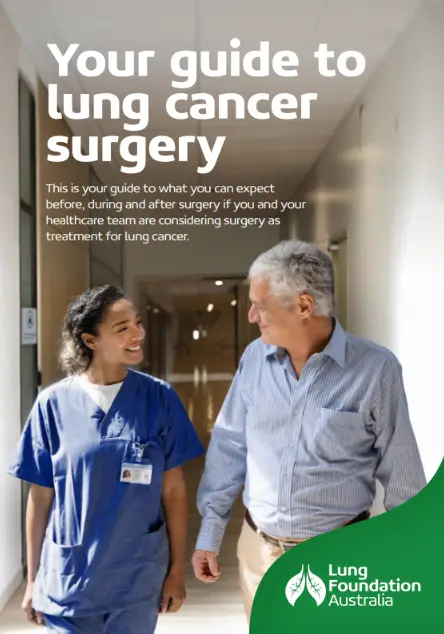This booklet provides essential information about lung cancer surgery, a common and effective treatment for removing cancerous tumours and surrounding tissue to prevent further spread. It is most often used for early-stage non-small cell lung cancer (NSCLC) but may also be considered in select cases of later-stage NSCLC or small cell lung cancer. Suitability for surgery and the type of surgery that is performed will depend on a range of factors and will be decided by your healthcare team.
The booklet outlines the types of lung cancer surgery, including:
- Lobectomy: removal of one or more lobes of the lung.
- Segmentectomy: removal of segments within a lobe.
- Wedge resection: removal of a small, wedge-shaped portion.
- Pneumonectomy: removal of an entire lung.
It also explains surgical approaches, such as:
- Thoracotomy: a traditional open surgery with a large incision.
- Minimally invasive techniques like Video-Assisted Thoracic Surgery (VATS) and Robot-Assisted Thoracic Surgery (RATS), which use small incisions and advanced tools for precision and faster recovery.
The booklet discusses risks associated with surgery, including reactions to anaesthesia, bleeding, blood clots, air leaks, and infections. Patients are encouraged to speak with their healthcare team to understand these risks and make informed decisions.
Preparation for surgery includes diagnostic tests (blood, urine, chest x-ray, ECG, lung function) and lifestyle changes such as quitting smoking, eating well, avoiding alcohol, and staying active. Emotional wellbeing is also addressed, with advice to seek support if feeling anxious or overwhelmed.
The booklet describes what to expect in hospital, including general anaesthesia, post-operative pain management, and the importance of breathing exercises and walking.
Recovery at home involves continued physical activity, healthy eating, and monitoring for signs of infection. Support from family and healthcare professionals is vital.
Finally, the booklet highlights Lung Foundation Australia, which offers resources, helplines, and information about rehabilitation programs to support patients and families throughout the surgical journey.
Was this page helpful?
Good job! Please give your positive feedback
How could we improve this post? Please Help us.
